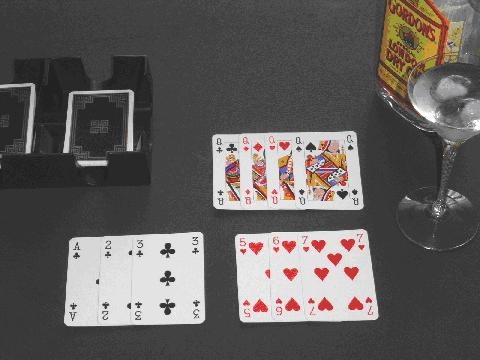The game was playable as it was, but a few of things struck us as being suboptimal. The betting phase seemed disjointed from the rest of the game, and the goal of a 5-card poker hand seemed restricting. It also seemed difficult to get new cards into play. After much deliberation and some additional play testing we think we addressed the issues while maintaining the heart of the game. I've dubbed the new iteration Trick Rummy.
Rather than being constrained to just two poker hands to receive a payout, in the new game you are dealt 10 cards and have to get at least nine of them into sets. The sets are of the typical Rummy variety; three or more of a kind or suited runs of three or more. This gives the players much more flexibility in choosing what cards to keep.
For the betting phase problem a different mechanism entirely was adopted. In some trick taking games it is common to bid on how many tricks you can take and/or to get the lead. We incorporated this idea in the following way. First, there is an ante. In order to have the game ramp up over time, this amount is based on the number of face up cards any player has on the table. Then the players bid in auction style. Only the winning bidder puts additional money into the pot. They get to lead. Essentially, they are betting how much more likely they will be to win the hand if they have the lead.
This notion was counterintuitive to me. It seems like you'd need the other players to put in money in order for coins to change hands. In practice, however, this system seems to work. Increasing the ante over time will address the free rider problem where people never bid and ignore the whole trick taking aspect of the game.
As far as the set collection aspect, the primary issue was a lack of new cards entering play. It was easy to get stuck in a situation where you need a particular card but just had to wait for it to appear by luck given very few opportunities. To address this, additional cards are added to the draft. The number is equal to the number of players. In addition, drafting continues for a number of rounds equal to the number of players minus one. This is for scalability because with more players there are likely to be more tricks taken during the trick taking phase.
As usual, the resulting game is different from what I would have come up with on my own. However, I think these differences are positive. Having other designers work on an idea with you is a great experience. If you haven't attended a Protospiel or Unpub, you don't know what you're missing!

 RSS Feed
RSS Feed